Introduction to Virtual USCHA Session 3
My Blackness Doesn’t Diminish Based On My Trans* Identity
Written by: Derek Baugh, TGNC CAP NMAC
Foreword: Carmarion D. Anderson, TGNC CAP NMAC
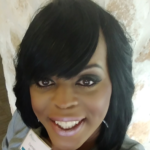
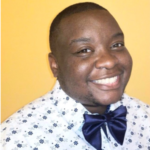 In light of the most recent killings of unarmed Black people, I have found myself in the midst of a sea of emotions. These emotions have ranged from anger and fury to fear and hopelessness. In the wake of the murders of both George Floyd & Breonna Taylor, the Black Trans community has rallied alongside our cisgender/heterosexual counterparts in several ways. Whether it is Black Trans people organizing protests, providing resources to protesters, or physically putting their bodies on the front line for a community, Black Trans identified individuals are fighting at the forefront of a movement from which we feel separated and treated as outcasts.
In light of the most recent killings of unarmed Black people, I have found myself in the midst of a sea of emotions. These emotions have ranged from anger and fury to fear and hopelessness. In the wake of the murders of both George Floyd & Breonna Taylor, the Black Trans community has rallied alongside our cisgender/heterosexual counterparts in several ways. Whether it is Black Trans people organizing protests, providing resources to protesters, or physically putting their bodies on the front line for a community, Black Trans identified individuals are fighting at the forefront of a movement from which we feel separated and treated as outcasts.
For years, Trans individuals have attended Trans Day Of Remembrance (TDOR) ceremonies, World AIDS Day activities, and various other community events. We have found ourselves in those spaces searching for those who call themselves our allies. In those solemn moments when we speak the names of our siblings, and now ancestors, which primarily consist of Black Trans women who die at the hands of cisgender men who are not unlike those they stand alongside when tragedies like this occur, and we wonder where our allies are. Where are the people who come and steal our culture and harness the talent from our community? Where are the people who throw around ballroom lingo but have no idea where it originated? Where are the people who see no issue with asking us personal questions or treating us like their own Trans glossaries? Where are our allies? Where is this fury and outrage when one of our Black Trans lives is senselessly stolen? Many of us are left angry and shouting that our Black Lives Matter Too, and yes, you would think this should be common knowledge. The exclusion of Black Trans individuals from this movement brings to mind a phrase, “I too am America”-Langston Hughes. We, too, are Black, and our lives matter.
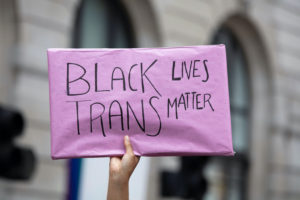 When a sibling-like Nina Pop or Tony McDade is killed, it is painful for us, the Trans community-at-large. It is doubly offensive when we are hushed and treated as shameful, confused, or embarrassing because of our gender identities by our cisgender counterparts. We are told or commanded to “be quiet” and “wait our turn” as if somehow these stolen Black lives are not as devastating or worth being upset about. Dr. Martin Luther King Jr. said, “For years now I have heard the word “Wait!” It rings in the ear of every Negro with piercing familiarity. This “Wait” has almost always meant “Never.” The silence from those we march alongside is piercing, deafening, and painful. When our Black Trans sisters are killed, dangerous and false narratives suggest they have “tricked” someone. Perhaps, if they had disclosed their gender identity earlier, their murder could have been prevented is the story that is perpetuated. Black Trans people are literally being told,” yeah, you can stay, just don’t be too loud.”
When a sibling-like Nina Pop or Tony McDade is killed, it is painful for us, the Trans community-at-large. It is doubly offensive when we are hushed and treated as shameful, confused, or embarrassing because of our gender identities by our cisgender counterparts. We are told or commanded to “be quiet” and “wait our turn” as if somehow these stolen Black lives are not as devastating or worth being upset about. Dr. Martin Luther King Jr. said, “For years now I have heard the word “Wait!” It rings in the ear of every Negro with piercing familiarity. This “Wait” has almost always meant “Never.” The silence from those we march alongside is piercing, deafening, and painful. When our Black Trans sisters are killed, dangerous and false narratives suggest they have “tricked” someone. Perhaps, if they had disclosed their gender identity earlier, their murder could have been prevented is the story that is perpetuated. Black Trans people are literally being told,” yeah, you can stay, just don’t be too loud.”
We ask those who are recipients of the rights, earned with the blood, sweat, and suffering of Black trans people to be true and intentional allies. Black trans people are educated, gifted, and talented, and by hiring this community allies will help create a path to leadership. Give up your seat at the proverbial table for a Black trans person. Don’t perpetuate false narratives. Have hard conversations. Call people out on their problematic statements. Do your own research. Compensate Black Trans people justly for their stories. My blackness doesn’t diminish based on my trans* identity; it diminishes when it is ignored!
The HIV Movement’s Problem with Race
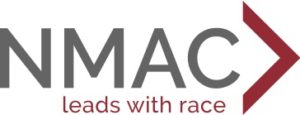 NMAC (formerly National Minority AIDS Council) was founded in 1987 because minorities were disproportionately impacted by a new retrovirus. Back in the ’80s, AIDS was labeled a “White gay disease.” We created NMAC to give voice to People of Color. While much has changed, HIV health outcomes continue to expose our movement’s problem with race. In America the color of your skin greatly determines your HIV health outcome. People of Color are the majority of new cases of HIV, the majority of people living with HIV, and the majority of people who die from HIV. Yet 75% of the people on PrEP are White. Since PrEP is the major tool used to prevent HIV, the results of HIV’s demographics are more than mathematical; they are racist.
NMAC (formerly National Minority AIDS Council) was founded in 1987 because minorities were disproportionately impacted by a new retrovirus. Back in the ’80s, AIDS was labeled a “White gay disease.” We created NMAC to give voice to People of Color. While much has changed, HIV health outcomes continue to expose our movement’s problem with race. In America the color of your skin greatly determines your HIV health outcome. People of Color are the majority of new cases of HIV, the majority of people living with HIV, and the majority of people who die from HIV. Yet 75% of the people on PrEP are White. Since PrEP is the major tool used to prevent HIV, the results of HIV’s demographics are more than mathematical; they are racist.
We’ve worked together for over 30 years, I’m not here to blame or shame, but to speak truth to our movement at a critical point in history. As our nation grapples with systemic racism highlighted by the Black Lives Matter movement, it is important to remember that people living with HIV, people on PrEP, staff, boards, constituents, donors, and peers are watching. Will you be the leader your agency/movement needs to get us through these troubled times? Our movement needs to reexamine what justice and success mean in a world after COVID-19, Black Lives Matter, and the unemployment of 40 million Americans that turned into a recession.
even if you’re choking on it-until you let the sun in. Then you can see it’s everywhere.
Kareem Abdul-Jabbar

Over $300 million in new HIV federal funding to end the HIV epidemic (EHE) is hitting the streets. This translates into thousands of new jobs and hundreds of new contracts for community-based organizations and others. Are federal agencies and health departments ready to distribute these funds in a fair and equitable way? Black Lives Matter is a call for justice for communities who too often are overlooked and ignored.
 In addition to HIV health outcomes, our movement also lacks people of color in leadership positions. The Black AIDS Institute did a survey that found “White people hold 67% of the senior leadership positions in AIDS service organizations.” Questions about race, gender, gender identity, and the sexual orientation of our leadership are part of the much wider discussion on equity, fairness and justice for communities who suffered from generational racism and oppression. To be clear, I’m not saying fire all the White people. I am saying that White leaders working in the HIV field have a unique responsibility to address race and how they will work to dismantle racist systems.
In addition to HIV health outcomes, our movement also lacks people of color in leadership positions. The Black AIDS Institute did a survey that found “White people hold 67% of the senior leadership positions in AIDS service organizations.” Questions about race, gender, gender identity, and the sexual orientation of our leadership are part of the much wider discussion on equity, fairness and justice for communities who suffered from generational racism and oppression. To be clear, I’m not saying fire all the White people. I am saying that White leaders working in the HIV field have a unique responsibility to address race and how they will work to dismantle racist systems.
It’s not just the leadership. Too many People of Color-focused HIV organizations have closed over the last 10 years. Just as we become the majority of the HIV epidemic, the agencies that were founded and led by People of Color are closing. Most of the initial funding for these agencies came from the Minority AIDS Initiative (MAI). Slowly, that money has been redirected and no longer prioritizes People of Color agencies per its original intent.
 What role does racial bias play when reviewing funding requests from People of Color organizations? This bias was recently acknowledged by the University of California when they stopped using SAT or ACT scores for college admission because of the racial bias of those tests. This matters to the HIV movement because we are about to distribute millions in new funding. Look at who gets funded to understand how systems are biased against people of color and the organizations they run. If we keep operating in the same ways, how can we expect different results? It is not enough to make a statement supporting Black Lives Matter. Now is the time to create and implement systems that value the leaders and communities hardest hit by HIV.
What role does racial bias play when reviewing funding requests from People of Color organizations? This bias was recently acknowledged by the University of California when they stopped using SAT or ACT scores for college admission because of the racial bias of those tests. This matters to the HIV movement because we are about to distribute millions in new funding. Look at who gets funded to understand how systems are biased against people of color and the organizations they run. If we keep operating in the same ways, how can we expect different results? It is not enough to make a statement supporting Black Lives Matter. Now is the time to create and implement systems that value the leaders and communities hardest hit by HIV.
 This is where the hard work begins. Community-based organizations, health departments, national organizations, and federal HIV agencies who want to end the HIV epidemic must address racism and its structural impact on America’s HIV outcomes. The work to build antiracist institutions starts with education. Understanding White privilege, unconscious implicit bias, and structural racism are essential before building plans.
This is where the hard work begins. Community-based organizations, health departments, national organizations, and federal HIV agencies who want to end the HIV epidemic must address racism and its structural impact on America’s HIV outcomes. The work to build antiracist institutions starts with education. Understanding White privilege, unconscious implicit bias, and structural racism are essential before building plans.
We are not any kind of role model. NMAC started our journey to build an anti-racist organization with the People’s Institute and their trainings on Undoing Racism for the agency’s board and staff. We had to educate ourselves before we could identify the changes needed at NMAC. This year there is a Track on Race at the United States Conference on HIV/AIDS. Your staff can discuss, argue, and hopefully better understand race and how it impacts HIV prevention, treatment, and care. At times this process can be very painful. Our movement has decades of history and misunderstandings.
NMAC was formed in 1987 because minorities were disproportionately impacted by AIDS. We are not going away. We are resolute in our commitment to ending HIV in a post COVID-19, Black Lives Matter, and the unemployment of 40 million Americans world.
NMAC

Launch Video
USCHA is Virtual & Free Online Oct. 19-21, 2020
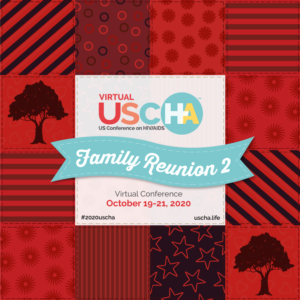 The 2020 United States Conference on HIV/AIDS will be virtual and free for the first 4,000 registrations*. You can find the latest information at the USCHA website or register for one of our June 25th webinars:
The 2020 United States Conference on HIV/AIDS will be virtual and free for the first 4,000 registrations*. You can find the latest information at the USCHA website or register for one of our June 25th webinars:
10:00 am Eastern time
1:00 pm Eastern time
3:00 pm Eastern time
The 2020 meeting will have five plenaries, 60 workshops, 14 institutes, and a Virtual Exhibit Hall. Workshops and plenaries will be online after the meeting for everyone to view for free.
The 2020 meeting tackles the seismic shifts that are changing our world. COVID-19 and Black Lives Matter have forever changed our work and the delivery of HIV prevention, care, treatment, and wrap around services. Consider submitting a workshop abstract on how your agency is responding. The meeting will have 10 different tracks. The deadline for abstract submission is July 17th.
 The meeting is free because it seemed tone deaf to ask for money when so many nonprofits are hurting and there are over 40 million people unemployed. Free registrations* are for community and only possible because our 2020 sponsors stepped up and continued to support the meeting. NMAC thanks our Presenting Sponsor Gilead, along with ViiV Healthcare, Janssen, Merck, and our Federal Partners, including the National Institutes of Allergy and Infectious Diseases. While registration is free, NMAC will ask for donations. You do not have to give, but I hope you will consider making a donation. Even with the sponsor fees, the board had to approve deficit spending to keep the agency whole during these challenging times.
The meeting is free because it seemed tone deaf to ask for money when so many nonprofits are hurting and there are over 40 million people unemployed. Free registrations* are for community and only possible because our 2020 sponsors stepped up and continued to support the meeting. NMAC thanks our Presenting Sponsor Gilead, along with ViiV Healthcare, Janssen, Merck, and our Federal Partners, including the National Institutes of Allergy and Infectious Diseases. While registration is free, NMAC will ask for donations. You do not have to give, but I hope you will consider making a donation. Even with the sponsor fees, the board had to approve deficit spending to keep the agency whole during these challenging times.
 The murder of George Floyd was another in a too long list of wake-up calls that Black Lives Matter. The issue is bigger than just the police. It was also a wake-up call for the HIV movement. The majority of people living with HIV are people of color and the majority of people on PrEP are white. Our HIV outcomes document the challenges that race plays in our field. NMAC challenges community-based organizations, health departments, health centers, national organizations and federal agencies to create and implement strategic plans to build antiracist HIV institutions.
The murder of George Floyd was another in a too long list of wake-up calls that Black Lives Matter. The issue is bigger than just the police. It was also a wake-up call for the HIV movement. The majority of people living with HIV are people of color and the majority of people on PrEP are white. Our HIV outcomes document the challenges that race plays in our field. NMAC challenges community-based organizations, health departments, health centers, national organizations and federal agencies to create and implement strategic plans to build antiracist HIV institutions.
 New programs at the 2020 USCHA include a Virtual Jobs Fair. Over 40 million people are unemployed. USCHA hopes to bring people needing jobs together with the HIV organizations who are hiring. Over $300 million in new funding was in the 2020 federal budget to end the HIV epidemic and that means thousands of new jobs. NMAC is giving free booths to the 57 jurisdictions targeted to receive this money so they or organizations in those jurisdictions can share job openings. Hire people from the communities your efforts hope to reach, particularly people in senior leadership positions.
New programs at the 2020 USCHA include a Virtual Jobs Fair. Over 40 million people are unemployed. USCHA hopes to bring people needing jobs together with the HIV organizations who are hiring. Over $300 million in new funding was in the 2020 federal budget to end the HIV epidemic and that means thousands of new jobs. NMAC is giving free booths to the 57 jurisdictions targeted to receive this money so they or organizations in those jurisdictions can share job openings. Hire people from the communities your efforts hope to reach, particularly people in senior leadership positions.
 Virtual conferences are another result of COVID-19. While we’ve gotten more adept at Zoom calls, virtual conferences are new. NMAC will host a series of webinars to help attendees get the most out of the meeting. Please register now (space is limited) for the first webinar on June 25th. This webinar will go over plans for the 2020 meeting and seek your input into this new adventure. Future webinars include 1) how to submit an abstract, 2) how to set-up a virtual exhibit booth, 3) how to record a virtual workshop, 4) how to participate in a virtual jobs fair, and 5) how to get the most out of a virtual conference.
Virtual conferences are another result of COVID-19. While we’ve gotten more adept at Zoom calls, virtual conferences are new. NMAC will host a series of webinars to help attendees get the most out of the meeting. Please register now (space is limited) for the first webinar on June 25th. This webinar will go over plans for the 2020 meeting and seek your input into this new adventure. Future webinars include 1) how to submit an abstract, 2) how to set-up a virtual exhibit booth, 3) how to record a virtual workshop, 4) how to participate in a virtual jobs fair, and 5) how to get the most out of a virtual conference.
 Given these turbulent times, USCHA has decided to return to our 2017 theme, Family Reunion II. Family are more than blood. They are the people you want to hug when you should be socially distant. NMAC remains committed to Puerto Rico. The 2022 USCHA will be in San Juan
Given these turbulent times, USCHA has decided to return to our 2017 theme, Family Reunion II. Family are more than blood. They are the people you want to hug when you should be socially distant. NMAC remains committed to Puerto Rico. The 2022 USCHA will be in San Juan  on Oct 10-13, 2022 and there will be a Spanish language track at this year’s meeting. This Friday is Juneteenth and NMAC will be closed. On this day we celebrate the emancipation of the last enslaved African Americans by the Confederacy.
on Oct 10-13, 2022 and there will be a Spanish language track at this year’s meeting. This Friday is Juneteenth and NMAC will be closed. On this day we celebrate the emancipation of the last enslaved African Americans by the Confederacy.
NMAC

*Free registrations are for people living with HIV/AIDS, people on PrEP, activists, community organizers, students and people working or volunteering at nonprofits, community-based organizations, national organizations, health departments, health centers, universities, researchers, or health professionals. Per federal regulations and at the request of the Centers for Disease Control and Prevention, NMAC cannot offer free registrations to federal employees. The registration fee is $250 for federal employees and employees of for-profit companies.
The Indian Health Service and the Albuquerque Indian Health Board, with resources from the Minority HIV/AIDS Fund, and in partnership with NMAC, will offer free registration for USCHA. The free registration applies to (1) U.S. federal- and state-recognized tribal members/citizens, employees, contractors, and volunteers; (2) U.S.-based Native Hawaiians and Pacific Islanders; and (3) others directly affiliated with those communities.
Combating Trauma in a Time of Isolation
NMAC Hails Supreme Court Decision Preserving DACA
NMAC today hailed today’s Supreme Court decision that preserves DACA protections for undocumented immigrants brought to the United States as children.
 “Today’s decision is a win not just for the immigrant community but for justice in immigration,” said Joe Huang-Racalto, NMAC’s Director of Government Relations and Public Policy. “After blatant abuses of undocumented immigrants and asylum seekers by this administration, we finally have a voice of reason in the Supreme Court saying ‘enough.’ We hope that this is just the beginning of comprehensive immigration reform and of compassionate approaches to those seeking safety and a better life in the United States.”
“Today’s decision is a win not just for the immigrant community but for justice in immigration,” said Joe Huang-Racalto, NMAC’s Director of Government Relations and Public Policy. “After blatant abuses of undocumented immigrants and asylum seekers by this administration, we finally have a voice of reason in the Supreme Court saying ‘enough.’ We hope that this is just the beginning of comprehensive immigration reform and of compassionate approaches to those seeking safety and a better life in the United States.”
NMAC leads with race to urgently fight for health equity and racial justice to end the HIV epidemic in America. Since 1987, NMAC has advanced our mission through a variety of programs and services, including: a public policy education program, national and regional training conferences, a treatment and research program, numerous electronic and print materials, and a website: www.nmac.org. NMAC also serves as an association of AIDS service organizations, providing valuable information to community-based organizations, hospitals, clinics, and other groups assisting individuals and families affected by the HIV epidemic.
NMAC Hails Supreme Court Decision In Bostock v. Clayton County
 NMAC today hailed the Supreme Court decision in Bostock v. Clayton County which protects LGBTQ workers from being fired or denied employment because of their sexual orientation or gender identity.
NMAC today hailed the Supreme Court decision in Bostock v. Clayton County which protects LGBTQ workers from being fired or denied employment because of their sexual orientation or gender identity.
“Today’s historic landmark decision by the Court ends decades of ugly behavior by employers who never valued a good employee and fired them because of who they are,” said Joe Huang-Racalto, NMAC’s Director of Government Relations and Public Policy.
By amending the Civil Rights Act of 1964, the Court ruled that Aimee Stephens, a transgender worker for a funeral home in Michigan, and Gerald Bostock, a gay employee for Clayton County in Georgia, were covered under sex discrimination as outlined in the Civil Rights Act of 64.
“Yesterday, millions of LGBT Americans went to bed fearing the loss of their jobs because of their sexual orientation or gender identity,” said Huang-Racalto. As a result of today’s decision, those same Americans will go to bed tonight knowing that they no longer have to be fearful of losing their jobs. In the absence of a functioning Senate, we are sadly becoming more dependent on a conservative court for full civil rights. And, while today is an historic day for LGBT Americans, we know that this journey won’t be completed until the full spectrum of rights are afforded to LGBT individuals. We will continue to fight against this administration’s unrelenting attacks against transgender Americans, especially discriminatory health practices, and we will continue to fight against the ugly health crisis known as racism which continues to grip our nation.”
NMAC honors the life of Aimee Stephens, who sadly passed away on May 12, 2020. While she was not alive to witness today’s landmark ruling, her courage and drive to improve the lives of transgender American’s will forever be memorialized.
NMAC leads with race to urgently fight for health equity and racial justice to end the HIV epidemic in America. Since 1987, NMAC has advanced our mission through a variety of programs and services, including: a public policy education program, national and regional training conferences, a treatment and research program, numerous electronic and print materials, and a website: www.nmac.org. NMAC also serves as an association of AIDS service organizations, providing valuable information to community-based organizations, hospitals, clinics, and other groups assisting individuals and families affected by the HIV epidemic.
The Reckoning
There is a reckoning coming to America about its legacy of racism. However, it is not limited to the police. This reckoning is about the systemic racism that impacts all facets of society, including the HIV movement. Unfortunately, HIV disproportionately impacts people of color, people with trans experience, black women, and gay men. How do we build an antiracist HIV movement that is committed to Black Lives Matter?
 This weekend I joined thousands of people who protested on the streets of DC. Walking with my mask, I was amazed at the diversity. Families of all races, all genders, and all sexual orientations came together in a peaceful protest. It was actually more like a celebration. People were dancing, drumming, singing, and chanting. There were no leaders, just concerned citizens who felt compelled to make their voices heard, even in the middle of COVID-19. I heard one father explain to his child that they were there to witness history and to fight to make the world a better place.
This weekend I joined thousands of people who protested on the streets of DC. Walking with my mask, I was amazed at the diversity. Families of all races, all genders, and all sexual orientations came together in a peaceful protest. It was actually more like a celebration. People were dancing, drumming, singing, and chanting. There were no leaders, just concerned citizens who felt compelled to make their voices heard, even in the middle of COVID-19. I heard one father explain to his child that they were there to witness history and to fight to make the world a better place.

 I just so happened to arrive when DC Mayor Muriel Bowser stepped on to Black Lives Matter Plaza. It was an honor to see her amazing protest art in front of the White House. Her leadership as a Black woman at this critical moment added to the peaceful and celebratory nature of the protests. She was a rock star and I honor her vision, strength, and courage to step up and be heard. I also loved that her mask matched her t-shirt.
I just so happened to arrive when DC Mayor Muriel Bowser stepped on to Black Lives Matter Plaza. It was an honor to see her amazing protest art in front of the White House. Her leadership as a Black woman at this critical moment added to the peaceful and celebratory nature of the protests. She was a rock star and I honor her vision, strength, and courage to step up and be heard. I also loved that her mask matched her t-shirt.
The HIV movement, like the rest of the world, has some serious soul searching to do. What does it mean for us to be an antiracist movement that is committed to Black Lives Matter? This is the challenge not only for community-based organizations, but also for health departments, health centers, national organizations, and federal agencies. We want to end the HIV epidemic that is overwhelmingly impacting people of color, yet so many of the top leadership positions are held by White people. I’m not saying fire all the White people, but I am asking leadership to work to end racism and to stand in solidarity with Black Lives Matter.
Fifty-seven jurisdictions are about to implement plans to end the epidemic in their regions. Will the plans address the racial dynamic that impacts HIV prevention, care, treatment, and wrap around services? White privilege is thinking you know the answers for communities that you cannot even begin to understand. This is not to say that all white people are racist; however, the reckoning is about all white people and the role they play in fighting or perpetuating racist systems. Only white people can end racism because all of the systems and power are built and maintained upon their privilege.








That is the double edged sword: why would anyone want to dismantle systems that are set-up to benefit them? Maybe because those systems are wrong. Just ask the family and loved ones of George Floyd, Breonna Taylor, Ahmaud Arbery, Christian Cooper, Dustin Parker, Neulisa Luciano Ruiz, Vampi Mendez Arocho, Monika Diamond, Lexi, Johanna Metzger, Serena Angelique Velazquez Ramos, Layla Pelaez Sanchez, Penelope Diaz Ramirez, Nina Pop, Helle Jae O’Regan, or Tony McDade.
The world is on fire. Ask yourself: are you the gasoline or the water? Thank you for your declarations of support, but that is just the first step. Now the real work begins. I challenge health departments, community-based organizations, health centers, national organizations, and federal agencies to create and implement strategic plans to make their institutions antiracist.
 One important step, especially during these difficult financial times, is to hire people of color, people of trans experience, Black women, and gay men. Our movement is about to experience the largest influx of new funding in the last two decades. Thousands of new people will be hired to carry out the various programs to end the HIV epidemic. Hire people who live in and are part of the communities our work hopes to reach. Employment is a critical social determinant of health and an important step towards racial justice.
One important step, especially during these difficult financial times, is to hire people of color, people of trans experience, Black women, and gay men. Our movement is about to experience the largest influx of new funding in the last two decades. Thousands of new people will be hired to carry out the various programs to end the HIV epidemic. Hire people who live in and are part of the communities our work hopes to reach. Employment is a critical social determinant of health and an important step towards racial justice.
Talk to me in two weeks, after I find out if I got COVID-19. This was a very personal decision and definitely not the right one for most people, especially people who are immune compromised. I support everyone’s right to protest or stay home and understand both sides equally. NMAC is proud to lead with race to end the HIV epidemic.
NMAC




